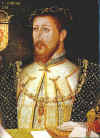Solway Moss
~24
Nov 1542~
|
In Jul 1542 the Scots continued the
raids across the English border. Henry
VIII. of England primarily saw a chance to rule
Scotland and to reduce the french influence and thus force James
V to change his hostile policy. Henry
mobilized soldiers in the northern earldoms and propagated his preparations for
war.
King James
V wanted to solve the problems peacefully and sent messengers to London. At
first Henry commanded a short revenge-raid but then sent other orders to the
Earl of Rutland (governor of the borders): he was willing to return to peace if
the state of both parties was balanced. |

James V
of Scotland |
In mid-Aug James
V. recalled his envoys from Windsor and Henry
commanded his vassals in the North to be prepared to follow his order to
march forward within one hour. Sir Robert Bowes and Archibald
Douglas, Earl of Angus, wanted to take their revenge for the Scottish ro ving by
attacking Teviotdale. On 24th of Aug they crossed the border between
Kelso and Jedburgh and burnt several farms and hams.
On the way back to England they were
attacked by 2000 Scots. Bowes and a few noblemen were captured, Angus
and his brother Sir George Douglas were able to escape to England. Henry
commanded the Duke of Norfolk to gather his army at Newcastle and
invade Scotland. On Sep 29th the army was to be set on march.
The Scots offered to continue negotiations and Norfolk,
Southampton and
Tunstall met Scottish envoys on 18th of Sep. The attack was delayed until Oct 6th. Henry commanded to stop the negotiations if the Scots
would not accept his conditions until Sep 29th.
King Henry VIII wanted the Scots to
free Bowes and the other prisoners without ransom but was willing to pay an
adequate ransom if the Scots insisted on it. The Scots also were
expected to agree to a new contract of delivery of traitors that
also should be valid for clerics. James
was expected to visit Henry and the Scots should offer hostages. The Scots
accepted all conditions but James
V refused to travel further south than York to meet Henry. The English
answered James
had not come to York in 1541 and Henry
was not willing to travel to York once more. Finally James
agreed to come to Huntingdon but as his wife was pregnant he would not be able
to meet him before Jan 15th. Henry
insisted in determining the place himself and declared that their meeting
could not wait until Jan. At this point the negotiations ended and both
sides prepared for war.
Anyhow Norfolk was not ready for marching as the ships with supplies and beer from London had not yet
reached Newcastle. Norfolk thus changed the offset from the 1st to the 7th and
finally to 11th of Oct. He promised Henry the greatest invasion of Scotland
since 100 years.
As the supply ships arrived at
Newcastle on 7th of Oct he worriedly found that the beer supply would
only last for six days portioning only two jugs for each soldier a day. That
could be dangerous.
On Oct 22nd Norfolk led
his army across the border near Berwick and burnt Eccles, Kelso and twenty
other villages. The beer anyhow did only last for four days and thus he
withdrew to England. Henry accepted his apology though he was disappointed
that such a large army had marched at such low effect. The Scots called it their victory.
Beaton wrote to the
Pope 40000 English had only come 5 km far and
returned to England as they heared that James led an army against them. James
himself led his men and prepared the invasion of the borders.
A Scottish army entered the West
Marches of England and was put to rout on Nov 14th, by a few
hundred borderers under Sir Thomas Dacre, the Bastard, and
Jack Musgrave of
Bewcastle.
On Nov 24th 18000 Scots crosed the
border near Gretna and burnt a few houses near the banks of the Esk. In the swamps of Solway Moss, less than a kilometer from the border
they were attacked by 3000 English soldiers and hastily fled. In the
battle only seven English and twenty Scots fell. Several Scots were
drowned on their flight.
The English captured 1200 soldiers
including two Earls, five Lords and 500 landowners and noblemen. Additionally
they gained 3000 horses, 30 standards, 20 canons, 120 guns and 4 carloads
of lances.
John Knox and following protestant authors of Scotland blamed Oliver Sinclair for the loss whereas the catholics blamed Lord Maxwell. For the Scots the battle was a
disaster. James V having seen the defeat of his army from a 10 km distance
was again embarrassed two weeks later when his wife bore him a daughter
and no son. On Dec 14. he died and the throne of Scotland was
succeeded by the only six days old Mary
Stuart.
Henry however brought the twenty prominent Scots to London where they were brought into the Tower on 19th
Dec, but released on 21st Dec and returned to Scotland in Jan
having accepted King Henry as guardian of Mary and signed a
contract due to which Prince Edward was to marry
Queen Mary
when they were old enough. In case of death of Mary,
Henry should be accepted as
successor (a secret contract that was signed by 10 Scottish Lords).
Henry had declared that according
to the oaths of 1097, 1189 and 1291 the Scots were to accept him as supreme master but he would refuse to insist on this against Mary as he before
had not insisted against his dearest nephew, James
V.


